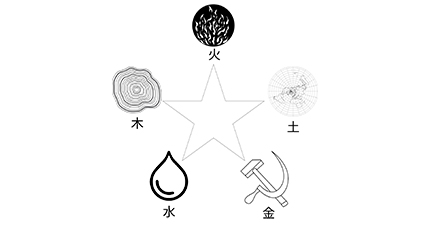A lot of the time, the sixth house is misunderstood to be the place of health or of the things that shape health, like routine. The sixth house is not the place where health lives. It’s the place of illness and disability. Firmicus describes the sixth house as the house of “physical infirmities and sickness,” calling it Mala Fortuna for bad fortune or bad form.
This is also why the sixth house is the place of labor, because labor is about wearing ourselves down. It’s about exchanging life for livelihood.
Mia Mingus writes about interdependence and disability and says:
“With disability justice, we want to move away from the “myth of independence,” that everyone can and should be able to do everything on their own. I am not fighting for independence, as much of the disability rights movement rallies behind. I am fighting for an interdependence that embraces need and tells the truth: no one does it on their own and the myth of independence is just that, a myth.”
The best way to describe the sixth house is that it is the place of needed interdependence. It opposes the twelfth house, which is the place of isolation. And I see this in conversation. People with north node in the sixth house, south node in the twelfth are yearning for a kind of mutual reliance that they were deprived of as isolated children.
So, the sixth house is the place of illness, disability, and labor. It is the place of unions, interdependency, and collusion. The sixth house is where we are reminded that our ableism will always be temporary—where myths of health or independence or individuality melt away. The sixth house rules the things that we cannot struggle for ourselves but must struggle for together.
The Sixth House Changes
The sixth house is about both illness and servitude. In the first phase of life, it’s meant to rule illnesses. The primary triplicity ruler of the sixth has to do with illness. In the second phase of life, between the first and second Saturn returns, the sixth house is supposed to be about your servants or employees and your secondary triplicity ruler is supposed to rule your servants. Then, the sixth house rules small animals. Your integrating triplicity ruler is meant to be about your relationship to animals that are smaller than you.
Sometimes, the sixth house is described as the house of pets because of its association with small animals. But small animals don’t just include pets, which is a very modern invention. Small animals also include ants, mice, and roaches. Most of us don’t have servants—most of us work in some kind of service capacity. Most of us know what it’s like to work during and through illness. The sixth house doesn’t change from labor to illness the moment you get sick. The sixth house stands for both labor and illness at the same time.
So, I don’t think the sixth house changes so much. There are young people who are ill and there are old people who are ill. There are young people who struggle to work and there are old people who struggle to work. I think that we center illness in the same way that we center labor, not as an essential part of identity but as a condition of survival. The sixth house is where we deal with conditions of survival.
Mercury and Mars
There is a quickness to the sixth house, I think, because of its association with Mercury. Mercury happens to be not only the planet of communication but also the planet that deals with labor. Strong Mercuries push themselves hard.
There is a busyness with the sixth house. Ilness makes people very busy. I’ve talked to several people who have a prominent sixth house who feel like they don’t know what to do with a day off. These are people who like to jump to problem solving and decision making when faced with something too great to solve. They’re the people who know how to balance a million tasks at once. They’re the people who might freak out when they make a mistake balancing a million things at once.
For Mars, which rejoices in the sixth house, I like to look at Karl Marx. He’s an Aquarius rising, which is the only sign to rejoice a fallen Mars. And Marx was disabled. He suffered what was called a “weak chest” in his youth and was excused from military service because of it. All his life, Marx had health problems due to poverty.
Marx looked at his world and wanted all of the mistreated people to rise up together. I know that part of this has to do with Cancer Mars, which is a Mars that wants to rage with others, but Marx didn’t just want to rise with a loved one or two. Marx was an organizer. He didn’t just write. He moved around and unionized the ill and the working. This is the sixth house. The sixth house isn’t just about mutual empathy but about the transformation of that empathy into dangerously organized action.
Mars rejoices in the sixth because Mars is about making trouble. The sixth house is about organized trouble, about scheduling care and about making your discontentment work like a movement. This is why the sixth house rules small animals—because small animals show us how to survive.
Working with the Sixth House
The sixth house isn’t about daily rituals such as eating, walking, and exercise. These rituals, which make up the stuff of life, are more about the third house. The sixth house is about organizing discontentment.
In this way, the sixth house has more to do with communication than the third. The sixth house is the Signal chat about the protest, is the union drive, and is the town hall meeting where someone inevitably says something upsetting to another.
There is an element of disagreement within consensus with the sixth house. There is a beautiful coming together but, because the sixth house is about survival conditions, it’s where we have learned to come together in and despite fear. There are always fights where there is organizing. The type of consensus that the sixth house offers is not one where the like minded blend together as if we were never apart to begin with but one where very different people with very different needs and lived experiences try to do a thing together.
There is freedom in the sixth house—there is the freedom to disagree. The sixth house is where we try to reconcile the needs of the ill with the needs of the working, which are one and the same. It’s where we try to find a way to support the immunocompromised and the essential worker, realizing with horror that we often cannot do this in the same lived quarters, that we need more resources than we have.
There is no right or wrong in the sixth house. There is only an endless shifting, perpetual negotiation, and the turbulence of compromise. It’s cooking a meal for a friend despite your after work exhaustion because you know they haven’t been eating. It’s organizing after hours even though you have work the next day. It’s watching the small grow into the big with a tremendous amount of daily effort. After all, that is how care becomes itself, isn’t it?


